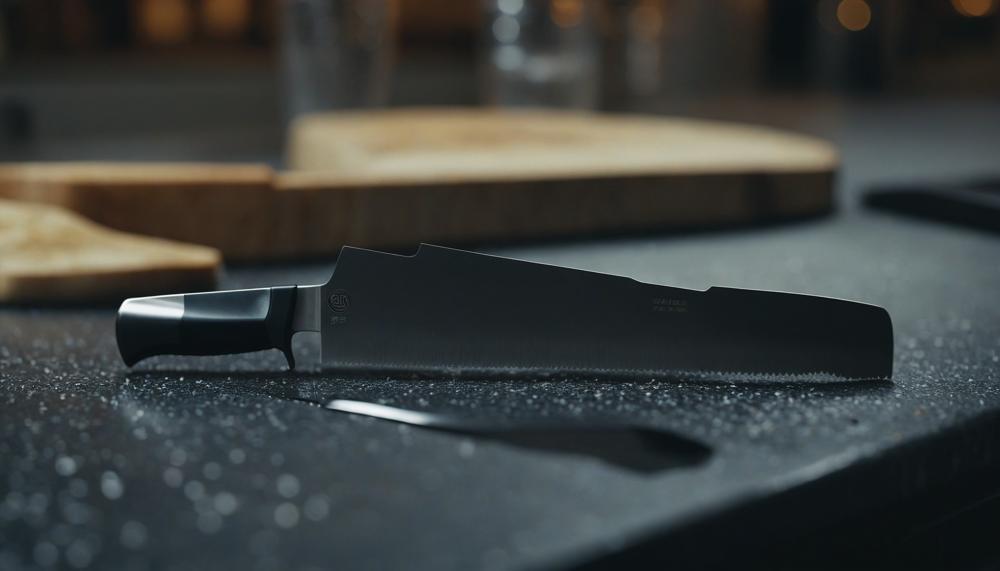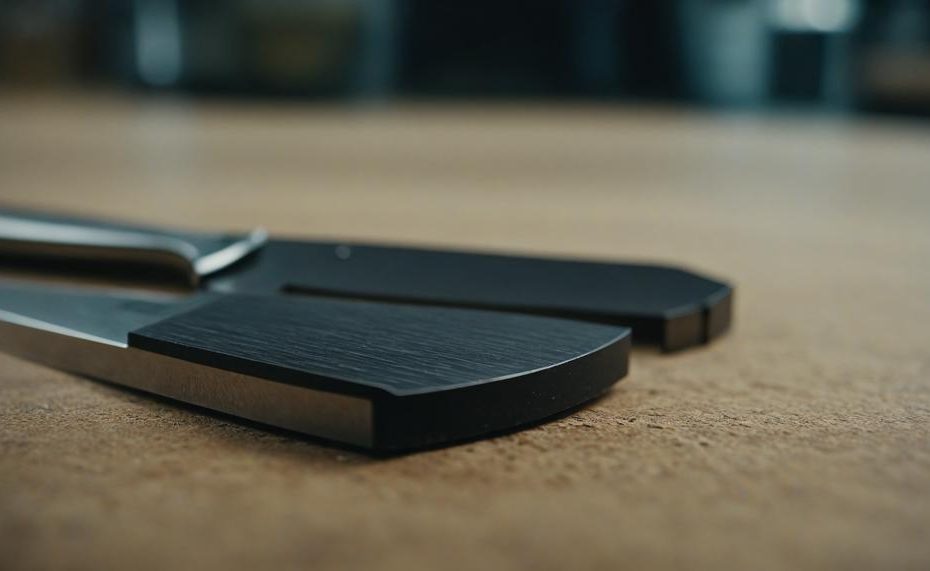Disposing of old kitchen knives isn’t just about tossing them in the trash—it’s about keeping everyone safe in the process. Improper disposal can lead to serious injuries for you, your family, and even sanitation workers.
Whether your knives are dull, broken, or simply ready to be replaced, knowing the right steps to take is crucial for safe disposal.
Key Takeaways:
- Donate: If the knife is still usable, consider donating it.
- Recycle: Take it to a scrap metal recycling center.
- Wrap and Box: Always wrap the blade in thick paper and place it in a sturdy box before disposing of it.
- Trash Disposal: When throwing away knives, ensure they are securely wrapped to prevent injuries.
With these steps, you can ensure that disposing of your kitchen knives is as safe as slicing through butter. Ready to dive deeper? Let’s explore each method in detail to keep you and others out of harm’s way.
Contents
- 1 Can you put old kitchen knives in the bin? is it safe and legal?
- 2 How to get rid of old knives
- 3 Should I drop off my old kitchen knives at a police station?
- 4 Are kitchen knives recyclable?
- 5 Can I carry a kitchen knife on the street, e.g. on the way to the recycling centre or to donate it?
- 6 Where to donate old kitchen or chefs’ knives
- 7 Do charity shops take kitchen knives?
- 8 Conclusion
Can you put old kitchen knives in the bin? is it safe and legal?
The safest and most legal way to dispose of old kitchen knives involves several responsible methods to ensure safety and compliance with local regulations. Here’s a detailed breakdown:
| Method | Steps | Notes |
| Donation |
|
Reduces waste and helps others. |
| Scrap Metal Recycling |
|
Environmentally friendly disposal. |
| Trash Disposal |
|
Last resort if other options are not available. |
Properly disposing of old kitchen knives is essential to prevent injuries and comply with local waste disposal regulations.
How to get rid of old knives
When it comes to getting rid of old kitchen knives, safety and responsibility are paramount. Here are some recommended methods to ensure you do so correctly:
| Method | Procedure | Notes |
| Wrap and Dispose | Wrap blade in newspaper and cardboard, secure with tape, place in a box | Ensures safety for all handling the trash |
| Recycling Centres | Take knives to a scrap metal recycling center | Environmentally friendly option |
| Donation | Donate usable knives to charities or thrift stores | Helps those in need |
| Knife Drop-Off Events | Check local council for scheduled events | Community-organized safe disposal |
| Mail-In Programs | Send knives to manufacturers offering recycling services | Check manufacturer’s website for details |
| Repurposing | Transform old knives into garden tools | Creative and sustainable |
Should I drop off my old kitchen knives at a police station?
No, you should not drop off your old kitchen knives at a police station for disposal. Police stations typically do not accept kitchen knives for disposal as they are not equipped to handle household waste.
However, there are several other safe and responsible methods to dispose of your old kitchen knives:
| Method | Description | Further Information |
| Donation | If the knives are still in fair condition, consider donating them to a local charity, shelter, or thrift store. | Salvation Army |
| Recycling | Take the knives to a scrap metal recycling center where they can be safely processed and reused. | Earth911 |
| Trash Disposal | If the knives are no longer usable, wrap them securely in several layers of newspaper or cardboard, label them as “sharp,” and dispose of them in your regular trash. | EPA Guidelines |
| Creative Repurposing | Repurpose the knives for other household tasks or crafts if they are not suitable for cutting food anymore. | DIY Network |
Are kitchen knives recyclable?

Kitchen knives can be recycled, but not through your typical household recycling bin. Here’s how you should handle their disposal:
| Disposal Method | Action | Safety Tips |
| Recycling | Take to a scrap metal recycling centre. | Wrap blades securely in paper and tape. |
| Donation | Give to a charity or someone in need. | Ensure knives are clean and safely packaged. |
| Repurposing | Use for other tasks around the home. | Handle with care during repurposing. |
| Trash Disposal | Place in regular trash as a last resort. | Wrap blades to prevent injury. |
Can I carry a kitchen knife on the street, e.g. on the way to the recycling centre or to donate it?
Yes, it is safe and legal to transport a kitchen knife for disposal or donation purposes, provided the blade is properly covered and protected. Here’s how to ensure you do it correctly:
- Cover the Blade: Use a sheath, thick cardboard, or bubble wrap to cover the knife blade securely. This prevents accidental injuries and keeps the knife from being an immediate threat.
- Transport Methods: Place the covered knife in a sturdy container, like a box or a bag. This keeps the knife stable and avoids alarming others.
- Check Local Laws: While generally legal, it’s wise to check local regulations regarding carrying knives. Some areas have specific rules on blade length and carry conditions.
- Destination Confirmation: Before heading out, contact the recycling centre or donation spot to ensure they accept knives. Not all facilities handle them, and some have specific guidelines.
Disposal Options:
| Method | Description | Considerations |
| Donation | Donate knives in good condition to thrift shops or shelters. | Ensure blades are covered; call ahead to confirm acceptance. |
| Recycling | Recycle knives at metal recycling centers. | Package knives safely; verify center policies. |
| Scrap Sale | Sell knives for scrap metal if they are not reusable. | Securely cover blades; find a licensed scrap dealer. |
| Trash Disposal | Wrap knives thoroughly and dispose of them in household trash. | Follow local trash disposal guidelines; package knives securely. |
Where to donate old kitchen or chefs’ knives
Donating old kitchen or chefs’ knives can be an excellent way to give back to the community. Here are some reputable organizations and charities that accept such donations:
| Organization | Website | Notes |
| Goodwill Industries | Goodwill | Ensure knives are wrapped safely |
| The Salvation Army | The Salvation Army | Call ahead to confirm acceptance |
| Habitat for Humanity ReStores | Habitat for Humanity ReStores | Knives should be wrapped safely |
| Local Community Centers | Contact your local center | |
| Culinary Schools | Inquire directly with the school | |
| Shelters and Soup Kitchens | Confirm with specific shelter or kitchen | |
| Knife Aid | Knife Aid | Redistributes donated knives |
Do charity shops take kitchen knives?
Yes, charity shops do take kitchen knives, but it’s crucial to confirm their specific policies beforehand.
Some charity shops accept kitchen knives as donations because they can be resold to raise funds for charitable activities. However, due to safety and liability concerns, not all charity shops may accept them. Here’s a closer look at whether charity shops are a safe and viable option for disposing of kitchen knives:
Are charity shops a safe and viable option for disposing of kitchen knives?
Charity shops can be a viable option for disposing of kitchen knives if they accept them. Here’s why:
- Safety Measures: When donating kitchen knives, it’s important to ensure they are securely wrapped and clearly labeled to prevent accidents. Most charity shops that accept knives have guidelines for safe handling and disposal.
- Policy Verification: It’s advisable to call the charity shop in advance to confirm if they accept knives. Policies vary widely; some might not accept them due to health and safety regulations.
- Environmental Impact: Donating knives allows them to be reused, which is an eco-friendly option compared to throwing them away. It reduces waste and supports sustainability.
Explanation:
- Check Policies: Before heading to a charity shop, check their policies. Not all charity shops accept kitchen knives, and those that do may have specific requirements for how the knives should be donated, including secure wrapping and labeling.
- Safety First: For shops that do accept kitchen knives, the primary concern is safety. Wrap the blades securely, preferably in a manner that prevents any sharp edges from being exposed. This ensures that handlers and customers are protected from accidental cuts.
- Legal and Environmental Considerations: Disposing of knives through donation is both legally compliant and environmentally responsible. It prevents knives from ending up in landfills and provides a practical reuse for items that are still functional.
Conclusion
Disposing of old kitchen knives demands careful attention to ensure safety for yourself and others. Here’s how you can do it responsibly:
- Donation: If your knives are still in good condition, consider donating them to local shelters, charities, or community kitchens. This not only helps those in need but also extends the life of your knives.
- Recycling: For knives that are no longer usable, take them to a scrap metal recycling center. Ensure they are securely wrapped in thick paper and placed in a sturdy box to prevent injuries during transport. Contact your local facility to confirm they accept metal knives.
- Safe Trash Disposal: If recycling isn’t an option, you can dispose of knives in your regular trash. However, it’s crucial to wrap the blades securely with thick paper or cardboard, label the package clearly as containing sharp objects, and place it in a strong box to avoid accidents.
By following these steps, you ensure that your old kitchen knives are disposed of in a manner that is both safe and environmentally friendly.





